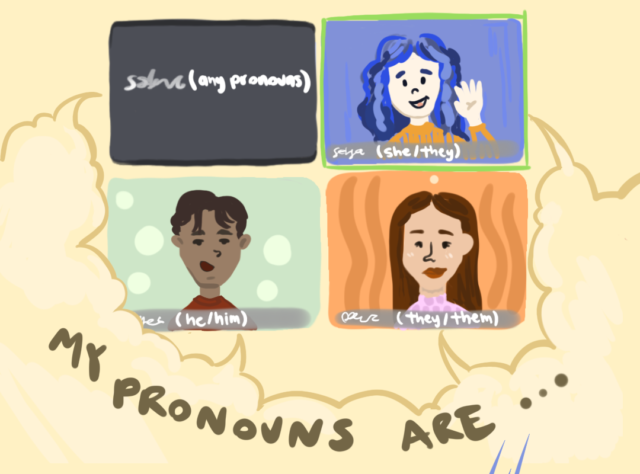Times have changed and so have pronouns.
Though it is common for students to share their preferred pronouns on their social media accounts, Zoom display names or email signatures, getting to a place at which one feels comfortable disclosing their pronouns is not a straightforward process.
Cameron Brewer, a second-year English student, uses he/they pronouns. Brewer said their pronouns are a way for them to further explore their relationship with gender identity, and although they’re still uncertain as to how they identify, they said that their pronouns allow room for them to question.
“I overperformed masculinity. … I thought I had to be a big, strong heterosexual male. A lot of stuff that I wanted to experiment with, like messing around with my hair, presenting differently – I didn’t feel that was an option,” Brewer said.
Brewer said they didn’t feel the pressure to fit into the stereotypical male role once they came to college and moved into an apartment with queer roommates who motivated Brewer to explore their gender identity.
Brewer is not alone when it comes to their relationship with gender nor when it comes to the rejection of gender as a strict, preestablished binary.
LJ, a third-year Asian American studies student who asked to remain partially anonymous because they have not openly disclosed their gender identity to some, said the euphoria they felt from fluid gender expression molded their self-identity.
“Obviously the way someone presents themselves doesn’t represent their gender. I just felt sometimes I wanted to look less feminine and sometimes I wanted to look more (feminine),” said LJ, who uses they/them pronouns and occasionally still uses she.
LJ said it was through reading that their perspective on gender changed. They said they felt a disconnection from womanhood after reading about gender’s connection to labor. For example, LJ said they specifically struggled with their gender identity when contemplating motherhood.
“I’m naturally a really caring person and I do really love kids, but I’m not sure if I want to reproduce because I don’t see myself being a mother,” LJ said.
James Yoon, a third-year chemistry student, uses he/they pronouns. They entered college using they/them pronouns but went back to using he/him pronouns as well.
“I think having both (he/him and they/them pronouns) gives me more flexibility and is a bit more true to how I feel,” Yoon said.
They said the use of the singular “they” provides a sense of neutrality in an otherwise gendered and binary-dominated language, and their sense of identity is connected to their relationship with language.
“The first time I learned about they/them pronouns was kind of crazy in such a gendered language. There is this gender-neutral pronoun that can apply to a singular person, and it’s been used in literature over time … it’s not just random,” Yoon said.
Yoon said it was after this experience that they started recognizing what parts of our language are gendered, adding that they drew inspiration from other languages in which gender binaries are not enforced.
Yoon also said that as much as their preferred pronouns are connected to their identity, they also belong to the social world – that is, the people around them. This influenced how Yoon decides which pronouns to use.
“There is a bit of code-switching,” Yoon said. “Personally, I think a lot of my gender expression and my identity is tied to how people perceive me. … You’re not just an isolated person. You’re also influenced by the people around you and the culture around you.”
Andy Cofino, director of the UCLA LGBTQ Campus Resource Center, said in an emailed statement that personal pronoun recognition at UCLA, while becoming more prevalent, is still a work in progress.
“At UCLA, there is not a uniform and systemic way to capture pronouns across the institution at this time. The UCLA Gender Recognition Act Taskforce has discussed developing such a mechanism, but the recommendations from the group have not yet been released,” said Cofino in the emailed statement.
Yoon said they know some people who have had trouble with the administration when it comes to misgendering.
At the same time, Brewer said some classes have included more LGBTQ+ perspectives, which may be helpful in exposing students to pronouns and identity.
“When more discussions about the importance of pronouns take place, it allows for greater understanding of the importance of proper pronoun usage as well as the negative impact of misgendering on transgender and nonbinary people in particular,” said Cofino in the emailed statement. “Therefore, further discussion about pronouns can create the possibility for a more inclusive environment for all at UCLA.”

